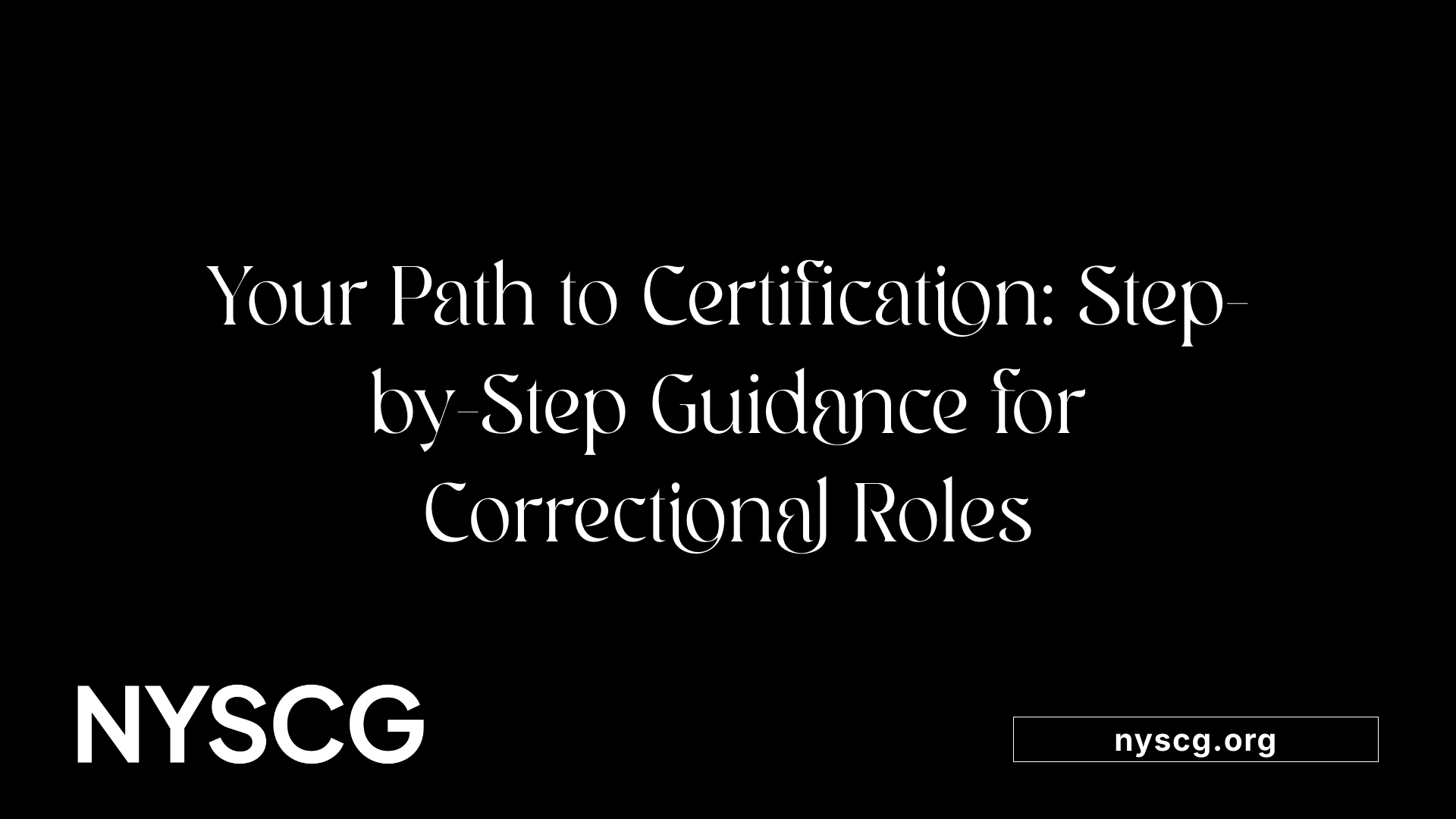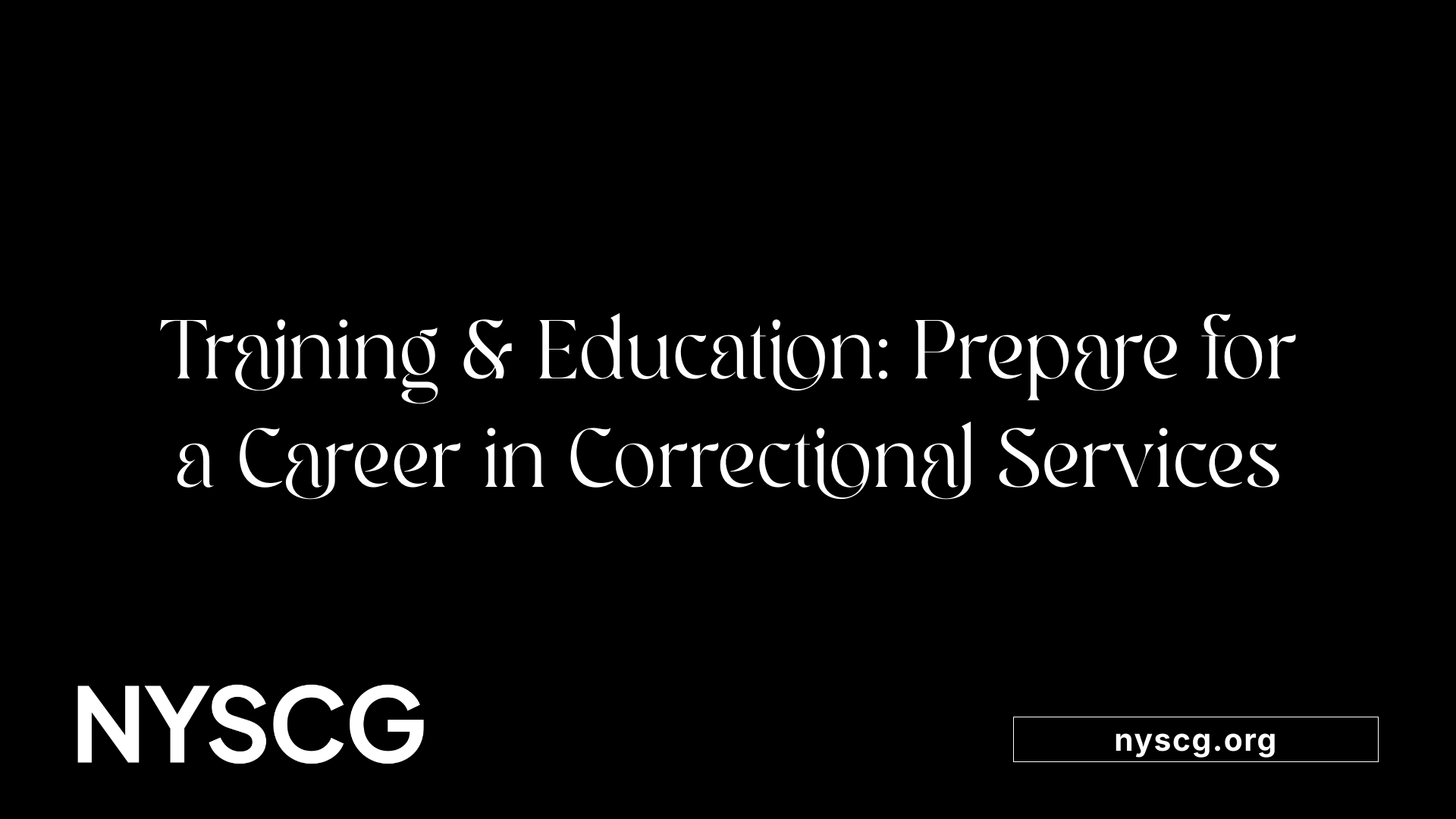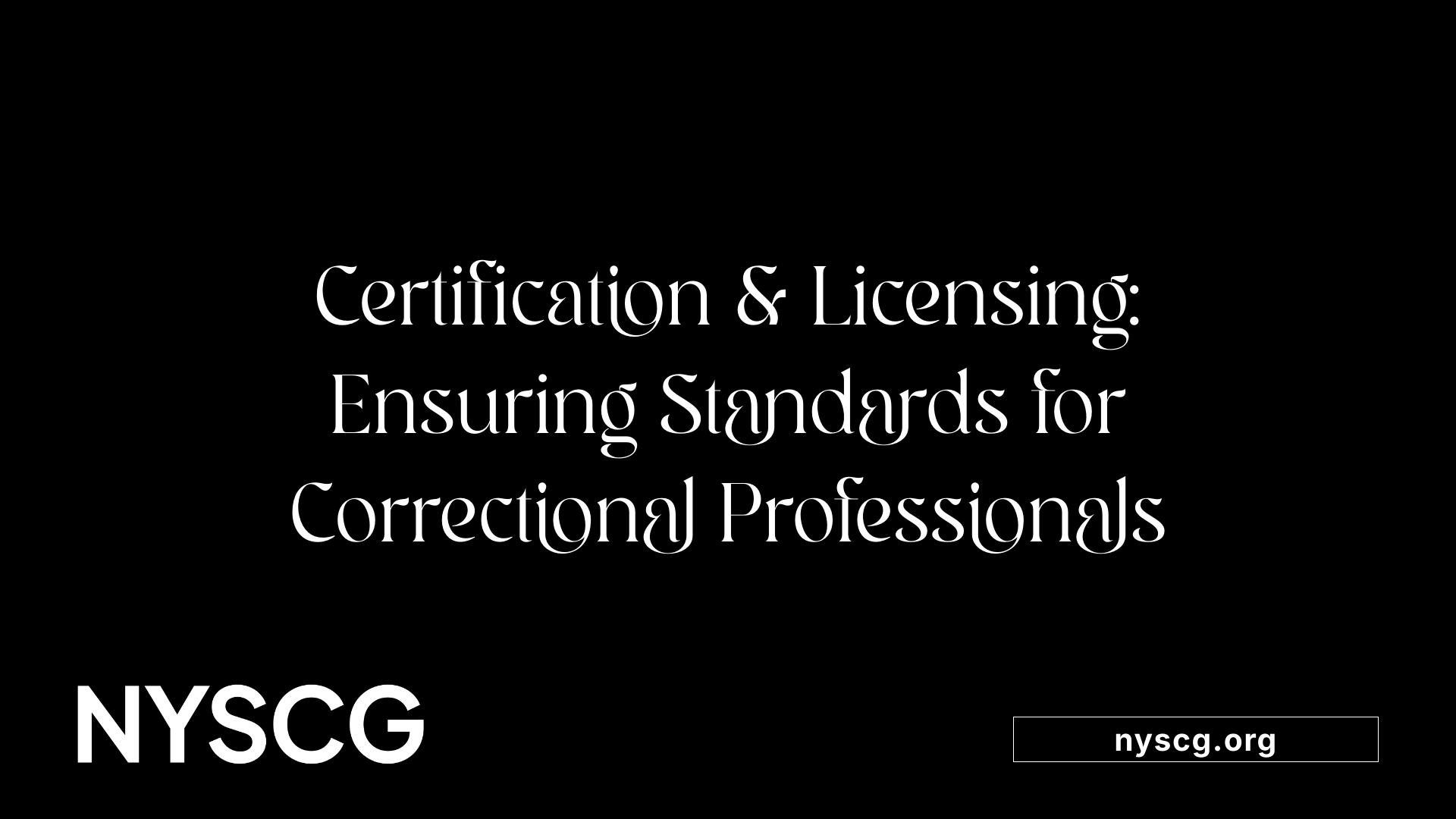How to Get Credentialed to Work in a State Facility or Prison


Entering the workforce in a correctional facility or prison involves understanding complex credentialing processes, requirements, and standards. This guide provides a detailed overview of the qualifications, procedures, educational pathways, and certification mandates necessary to secure employment in these security-sensitive environments, emphasizing compliance with federal and state regulations to ensure safety, professionalism, and career advancement.

To work as a correctional officer or in related correctional roles in Florida, applicants must meet several fundamental criteria. These include being a U.S. citizen or lawful permanent resident. Age requirements specify that candidates must be at least 18 years old to apply, but for certain roles like correctional officers, the minimum age is 18 or 19 depending on the specific position.
Educational prerequisites are also essential. Applicants are required to hold at least a high school diploma or GED. Those aiming for correctional probation positions must have a bachelor’s degree, while correctional officers typically must provide official high school transcripts or equivalent documents.
In addition to educational qualifications, applicants must pass a series of background and health assessments. These include a criminal background investigation, drug testing, and a physical examination by a licensed medical professional. Good moral character is mandatory, meaning applicants must not have been convicted of felony crimes or disqualifying misdemeanors, especially those involving perjury or false statements.
Candidates should also demonstrate physical and psychological fitness necessary for demanding correctional environments. Valid driver’s licenses are often required, and service records such as military discharge papers might be beneficial, especially for those with prior military experience.
Finally, most correctional employment positions require successful completion of specialized training, such as a correctional officer academy, and the achievement of certification from the Florida Criminal Justice Standards and Training Commission. These standards ensure that applicants are well-prepared for the responsibilities they will face and adhere to the legal and professional codes of conduct expected in correctional settings.

Becoming a certified correctional officer in Florida involves several structured steps designed to ensure only qualified individuals enter the profession. The process begins with submitting an application through the appropriate channels, usually via the state's official employment system such as People First. The application must demonstrate that the candidate meets all minimum qualifications, including age, U.S. citizenship, and educational requirements.
Once the application is submitted, candidates are required to pass the Correctional Officers Basic Ability Test (COBAT) with a score of 70% or higher, along with other physical ability tests. Applicants for non-certified positions may also attend sponsor training at the Northeast Florida Criminal Justice Center. For certified applicants, prior certification from the Florida Criminal Justice Standards and Training Commission is necessary.
A comprehensive background investigation is a critical part of the process. This involves fingerprinting by the employing agency, with prints processed by the FDLE and FBI to review criminal history and ensure good moral character. Medical examinations, including drug testing and physical assessments, are also mandatory.
After successful completion of the examinations and background checks, the candidate's employment documentation is verified. The employing agency then submits an official application for certification, which is reviewed by the Florida Criminal Justice Standards and Training Commission.
Candidates must also submit a CJSTC-68 Affidavit of Applicant Form, affirming their eligibility and good character. Following review, if all criteria are met, the individual is certified and eligible to work as a correctional officer within the state.
Certification relies heavily on passing the State Officer Certification Examination, which is administered electronically. Candidates have up to three attempts to pass this exam. Passing the exam signifies that the applicant has the necessary knowledge and skills to perform correctional duties.
All correctional officers must complete the Florida Basic Recruit Training Program or an equivalent training process, such as the EOT for experienced officers. This intensive, in-person program typically lasts around 445 hours and covers security procedures, communication, first aid, firearms, and offender management.
Exemptions from training requirements may be granted to those with recent full-time service as sworn officers, military personnel, or special operations forces, provided they meet specific service criteria.
A fingerprint-based background investigation is mandated, processed by FDLE and FBI, to confirm the applicant’s criminal history and eligibility. This step is fundamental to ensure the applicant’s good moral character and trustworthiness.
Once certified, applicants must secure employment with a Florida criminal justice agency. The agency conducts further background and employment verification, including drug testing. They then submit an employment packet for review and certification, ensuring the applicant's documentation aligns with state standards.
Certification is valid for three years, requiring officers to engage in ongoing training and education to maintain certification status. This involves completing mandated retraining or educational hours, attending seminars, and submitting documentation demonstrating continuing professional development.
This structured process ensures that all correctional professionals in Florida are well-trained, qualified, and uphold the standards of the criminal justice system, ensuring safety and integrity within correctional facilities.

To become a correctional or law enforcement officer in Florida, candidates must undertake specific training and educational programs to meet state requirements. The foundational step involves completing a police or correctional academy, which offers comprehensive instruction on legal issues, ethics, communication skills, safety procedures, security protocols, inmate management, crisis intervention, and health-related topics.
These training courses are typically conducted in-person at certified academies and span around 300 to 445 hours, depending on the specialization. During this period, applicants are also tested on physical fitness and firearm proficiency, essential for optimal performance in the field. They must pass a series of exams, including a Commission-approved Basic Abilities Test (BAT), to demonstrate their readiness.
Educational prerequisites for applicants include a high school diploma or GED, with some positions preferring or requiring additional college credits or relevant experience. For correctional probation officers, a bachelor’s degree is often mandatory, emphasizing the importance of advanced education for higher-tier roles.
Beyond initial training, ongoing education and recertification are vital. Certified officers are required to participate in continuous training sessions, which include updates on law enforcement practices, mental health awareness, and specialized skills. Certifications from recognized bodies, such as the American Correctional Association, can further enhance career advancement.
Colleges and universities often partner with correctional agencies to provide academic and vocational coursework, helping candidates acquire degrees or vocational skills aligned with their career goals. These programs include curriculum in fields like criminal justice, social services, and vocational trades, providing practical skills applicable within correctional settings.
The combination of rigorous training, academic preparation, and continuous education ensures that correctional staff are well-equipped to perform their duties effectively and ethically, fostering safer facilities and promoting positive inmate rehabilitation.
| Program Type | Duration | Focus Area | Certification or Credential |
|---|---|---|---|
| Police / Correctional Academy | 300-445 hours | Security, Safety, Inmate Management | State Certification |
| Specialized Modules | Varies | Crisis response, health, mental health | Ongoing recertification |
| Academic Education | Varies | Criminal justice, vocational skills | Degrees, Certificates |
| Continuing Education | Ongoing | Law updates, specialized skills | Renewal Certifications |
This structured training pathway ensures candidates meet Florida’s standards for correctional and law enforcement professionals, preparing them for successful careers in the criminal justice system.
 In Florida, becoming a certified correctional or law enforcement officer involves several steps to meet state and national standards. Initially, applicants must satisfy eligibility criteria, including age (at least 18 for corrections, 19 for law enforcement and correctional probation), U.S. citizenship, high school diploma or GED, and good moral character. A clean criminal history is essential, with no felony or disqualifying misdemeanor convictions, and a dishonorable military discharge disqualifies candidates.
In Florida, becoming a certified correctional or law enforcement officer involves several steps to meet state and national standards. Initially, applicants must satisfy eligibility criteria, including age (at least 18 for corrections, 19 for law enforcement and correctional probation), U.S. citizenship, high school diploma or GED, and good moral character. A clean criminal history is essential, with no felony or disqualifying misdemeanor convictions, and a dishonorable military discharge disqualifies candidates.
The process begins with completing a commission-approved training program. For correctional officers, this typically is the Basic Correctional Officer Academy, a comprehensive in-person course lasting about 445 hours. Law enforcement officers engage in similar basic recruit training and may also qualify through an Equivalency of Training (EOT) route if they meet specific experience criteria.
After training, candidates must pass the State Officer Certification Examination, an electronic test with three attempts allowed. Successful completion of this exam allows individuals to seek employment with a Florida criminal justice agency. During this phase, fingerprinting is conducted, and background investigations are performed, including drug testing and medical examinations. Once employed, agencies file certification applications on behalf of the officers, which are reviewed and approved by the Florida Criminal Justice Standards and Training Commission.
Maintaining certification requires ongoing professional development. Officers must complete mandatory retraining or continuing education hours periodically, often every three years, to ensure they stay current with legal updates, procedural changes, and specialized skills.
For those interested in specialized roles, additional certifications are available. For example, correctional behavioral health staff may pursue specific credentials to demonstrate expertise in mental health services within correctional settings. These certifications help improve professional standing and qualify staff for advanced roles.
Verification of certification status can be checked through official Florida criminal justice agencies or licensing directories, ensuring officers and correctional staff maintain valid credentials.
Overall, the certification and licensing process in Florida is designed to uphold high standards for professionalism, accountability, and ongoing competence in the correctional and law enforcement fields.
More Information Search Query: correctional officer licensing certification process requirements
| Step | Requirement | Description |
|---|---|---|
| 1 | Eligibility Criteria | Age, citizenship, education, moral character |
| 2 | Training Program | Basic Recruit Training or Equivalency of Training |
| 3 | Certification Exam | Pass State Officer Certification Examination |
| 4 | Background Checks | Fingerprinting, criminal record review |
| 5 | Employment Process | Apply through employer, certification review |
| 6 | Continuing Education | Regular retraining, recertification every 3-4 years |
| 7 | Specialized Certifications | Mental health, behavioral health, or other specialties |
This structured process ensures personnel are qualified, competent, and committed to public safety and service standards.
Applying for a correctional officer job in Florida involves several steps to ensure only qualified and suitable candidates are hired. Potential employees must first submit a detailed application through the designated system, such as the People First platform. This application includes personal details, proof of U.S. citizenship or lawful residency, and official transcripts or diplomas confirming educational credentials.
Once the application is submitted, candidates undergo a comprehensive background investigation. This investigation covers criminal record checks, credit history, and inquiries with previous employers and personal references. The goal is to assess moral character and suitability for a correctional environment.
Candidates must also pass a series of assessments including written exams, physical fitness tests, and psychological evaluations. An essential part of the screening is fingerprinting using Live Scan technology, which is processed by the FDLE and FBI. Fingerprinting is required only after initial approval and is used to verify identity and check for any disqualifying criminal history.
Drug testing is another mandatory requirement, with successful candidates needing to pass screening for substance use. The entire employment screening process typically takes around 2 to 3 months, from application submission through completion of all testing and investigations.
Only after passing all these screening steps and completing required training can candidates be officially hired. The process aims to select individuals who are not only qualified but also demonstrate the integrity and mental stability necessary for working in correctional facilities.
To maintain safety and regulatory compliance, correctional facilities are subjected to rigorous standards and inspection protocols. These standards encompass health, safety, and sanitation measures designed to protect inmates and staff alike.
Regular inspection schedules play a vital role in ensuring these standards are upheld. Typically, facilities undergo at least two comprehensive evaluations each year conducted by designated Environmental Health Officers. These inspections focus on key areas such as hygiene, structural integrity, fire safety measures, pest control, and proper ventilation. Inspection reports document any deficiencies found, and facilities are required to implement corrective actions within prescribed timeframes to address identified issues.
Accreditation by organizations like the American Correctional Association (ACA) further reinforces safety and operational standards. The ACA mandates compliance with detailed requirements concerning safety protocols, security measures, human rights, and overall facility management. Facilities are subjected to an audit process at least every three years, where inspectors review policies, procedures, and physical conditions to verify adherence to accreditation standards.
In addition to general safety, facilities must adhere to the Prison Rape Elimination Act (PREA) standards. These policies include rigorous staff background checks, ongoing staff training, inmate protection procedures, and clear protocols for investigating allegations of sexual abuse. These measures aim to create a safer environment and ensure accountability.
Development and enforcement of facility policies are critical in maintaining compliance. Facilities must regularly update their safety procedures based on inspection outcomes, accreditation requirements, and evolving best practices. Continuous monitoring, staff training, and a proactive approach to safety issues underpin an effective correctional environment.
For more detailed guidance on standards and inspection procedures, searching with a query like "prison facility safety standards inspections" can provide additional resources and specific regulatory requirements.
Navigating the credentialing landscape for correctional and prison employment is essential for building a successful and compliant career in criminal justice. From meeting basic eligibility to completing rigorous training, passing examinations, and adhering to strict standards, each step ensures that professionals are prepared to serve in high-security, rehabilitative, and supervisory roles. Staying informed about ongoing certification requirements and facility safety standards maintains not only personal career growth but also supports the overarching goal of secure, humane, and effective correctional systems. With dedication and adherence to these protocols, aspiring correctional staff can secure certification, demonstrate their professionalism, and open doors to future advancement within the justice system.
All you need is the will to make the world a better place.
New York State chaplain group inc. is a tax deductible organization with a federal tax Id number 92-383-4921